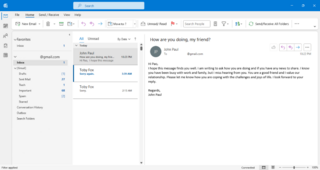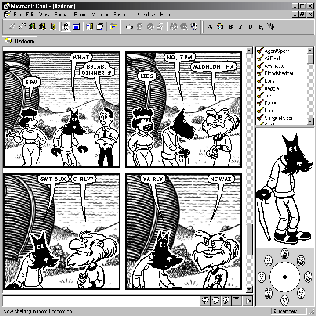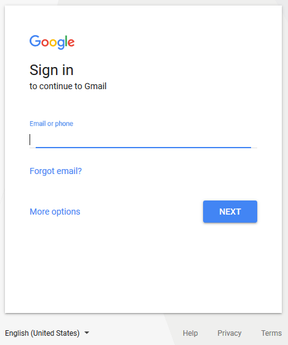ICQ New is a cross-platform instant messaging (IM) and VoIP client. The name ICQ derives from the English phrase "I Seek You". Originally developed by the Israeli company Mirabilis in 1996, the client was bought by AOL in 1998, and then by Mail.Ru Group in 2010.

Microsoft Outlook is a personal information manager software system from Microsoft, available as a part of the Microsoft 365 software suites. Though primarily being popular as an email client for businesses, Outlook also includes functions such as calendaring, task managing, contact managing, note-taking, journal logging and web browsing.

Outlook Express, formerly known as Microsoft Internet Mail and News, is a discontinued email and news client included with Internet Explorer versions 3.0 through 6.0. As such, it was bundled with several versions of Microsoft Windows, from Windows 98 to Windows Server 2003, and was available for Windows 3.x, Windows NT 3.51, Windows 95, Mac System 7, Mac OS 8, and Mac OS 9. In Windows Vista, Outlook Express was superseded by Windows Mail.

Yahoo! Messenger was an advertisement-supported instant messaging client and associated protocol provided by Yahoo!. Yahoo! Messenger was provided free of charge and could be downloaded and used with a generic "Yahoo ID" which also allowed access to other Yahoo! services, such as Yahoo! Mail. The service also offered VoIP, file transfers, webcam hosting, a text messaging service, and chat rooms in various categories.

Microsoft Comic Chat is a graphical IRC client created by Microsoft, first released with Internet Explorer 3.0 in 1996. Comic Chat was developed by Microsoft Researcher David Kurlander, with Microsoft Research's Virtual Worlds Group and later a group he managed in Microsoft's Internet Division.

File Explorer, previously known and still sometimes called Windows Explorer, is a file manager application and default desktop environment that is included with releases of the Microsoft Windows operating system from Windows 95 onwards. It provides a graphical user interface for accessing the file systems. It is also the component of the operating system that presents many user interface items on the screen such as the taskbar and desktop. Controlling the computer is possible without File Explorer running. After the name change that was introduced in Windows 8, Windows Explorer name can still be seen when you look for it in the Windows Task Manager.

A play-by-post role-playing game is an online text-based role-playing game in which players interact with each other and a predefined environment via text. It is a subset of the online role-playing community which caters to both gamers and creative writers. Play-by-post games may be based on other role-playing games, non-game fiction including books, television and movies, or original settings. This activity is closely related to both interactive fiction and collaborative writing. Compared to other roleplaying game formats, this type tends to have the loosest rulesets.
Microsoft Notification Protocol is an instant messaging protocol developed by Microsoft for use by the Microsoft Messenger service and the instant messaging clients that connect to it, such as Skype since 2014, and the earlier Windows Live Messenger, MSN Messenger, Windows Messenger, and Microsoft Messenger for Mac. Third-party clients such as Pidgin and Trillian can also communicate using the protocol. MSNP was first used in a publicly available product with the first release of MSN Messenger in 1999.
MSN Chat was the Microsoft Network version of IRCX, which replaced Microsoft Chat, a set of Exchange-based IRCX servers first available in the Microsoft Comic Chat client, although Comic Chat was not required to connect.

Windows Live Web Messenger is the discontinued browser-based version of Windows Live Messenger developed by Microsoft which allowed users to send instant messages online and in real-time with others using the Microsoft Messenger service from within a web browser. The service allowed users without administrative privileges on their computer, such as at a shared public computer, to chat with others on their Messenger contact list without having to install the Windows Live Messenger client.

OneDrive Groups, formerly Windows Live Groups, was an online service by Microsoft as part of its Windows Live range of services that enabled users to create their social groups for sharing, discussion and coordination.

Outlook.com is a free webmail service offered by Microsoft, featuring mail, calendaring, contacts, and tasks services. Outlook can also be accessed via email clients using the IMAP or POP protocols.
Fotki is a digital photo sharing, video sharing and media social network website and web service suite; it is one of the world's largest social networking sites. As an image hosting service, Fotki licenses photo-sharing software for global companies such as Telecom Italia, Alice.it, Sears, Mark Travel, Vegas.com, and Funjet.com, among others.

MSN Messenger, later rebranded as Windows Live Messenger, was a cross-platform instant-messaging client developed by Microsoft. It connected to the Microsoft Messenger service and, in later versions, was compatible with Yahoo! Messenger and Facebook Messenger. Versions were developed for Windows, Xbox 360, Mac OS X, BlackBerry OS, iOS, Java ME, S60 on Symbian OS 9.x, MSN TV, Zune HD, Windows Phone, Windows Mobile and Windows CE.

The Gmail interface makes Gmail unique amongst webmail systems for several reasons. Most evident to users are its search-oriented features and means of managing e-mail in a "conversation view" that is similar to an Internet forum.

WebChat Broadcasting System, or WBS for short, is a virtual community created during the 1990s. Supported by online advertising, it was one of few services at the time to offer free integrated community services including chat rooms, message boards, and free personal web pages. Extremely popular during the mid to late 1990s in the era prior to the Dot-com bust, WBS was at that time the largest and best-known social media website on the internet. In 1998, WBS was acquired by the search engine Infoseek, which was in turn acquired by Disney/ABC. The original WebChat Broadcasting System closed on 15 September 1999 after its chat rooms were integrated into Disney's existing Go Network chat rooms. A revival of WBS was launched in 2009 and is virtually identical to the original community.

Multiply was a social networking service with an emphasis on allowing users to share media – such as photos, videos and blog entries – with their "real-world" network. The website was launched in March 2004 and was privately held with backing by VantagePoint Venture Partners, Point Judith Capital, Transcosmos, and private investors. Multiply had over 11 million registered users. The company was headquartered in Boca Raton, Florida but moved to Jakarta, Indonesia early in 2012 and recently announced intentions to switch to e-commerce, dropping the social networking aspect entirely. Quantcast estimates Multiply had 2.47 million monthly U.S. unique visitors at their peak on July 30, 2012.
Microsoft mobile services are a set of proprietary mobile services created specifically for mobile devices, they are typically offered through mobile applications and mobile browser for Windows Phone, | platforms, BREW, and Java. Microsoft's mobile services are typically connected with a Microsoft account and often come preinstalled on Microsoft's own mobile operating systems while they are offered via various means for other platforms. Microsoft started to develop for mobile computing platforms with the launch of Windows CE in 1996 and later added Microsoft's Pocket Office suite to their Handheld PC line of PDAs in April 2000. From December 2014 to June 2015, Microsoft made a number of corporate acquisitions, buying several of the top applications listed in Google Play and the App Store including Acompli, Sunrise Calendar, Datazen, Wunderlist, Echo Notification Lockscreen, and MileIQ.

MSN Dial-up is an Internet service provider operated by Microsoft in the United States and formerly also in several other countries. Originally named The Microsoft Network, it debuted as a proprietary online service on August 24, 1995, to coincide with the release of Windows 95. In 1996 and 1997, a revised web-based version of the ISP was an early experiment at interactive multimedia content on the Internet.

Mail is an email client developed by Microsoft and included in Windows Vista and later versions of Windows. It is available as the successor to Outlook Express, which was either included with, or released for Internet Explorer 3.0 and later versions of Internet Explorer.












